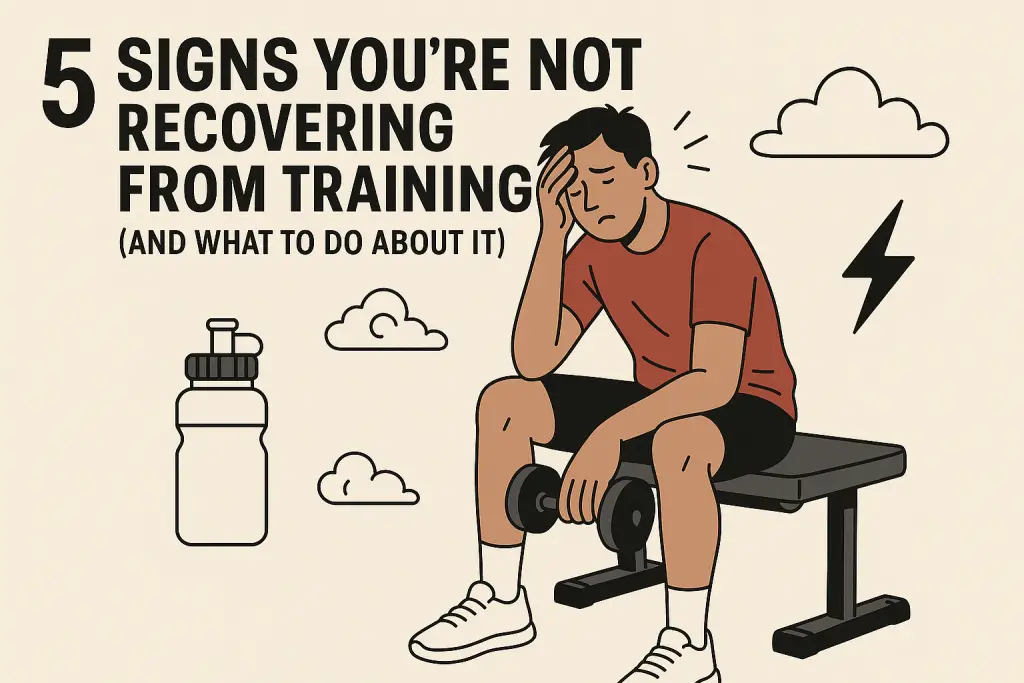5 Signs You’re Not Recovering from Training (and What to Do About It)

You’ve nailed your training program, you’re eating enough protein, and yet your progress feels stuck. If this sounds familiar, the problem might not be your workouts—it might be your recovery.
When people hear “recovery,” they usually think rest days and protein shakes. And sure, that helps—but real recovery goes deeper. It’s about sleep, stress management, hydration, and knowing when you’re overdoing it.
Here are 5 clear signs that your body’s screaming, “Hey, we need a break here!”
1. You’re Sore—All the Time
A bit of soreness after lifting is normal. But feeling permanently wrecked, day after day? That’s your body saying it can’t keep up.
What’s going on?
Constant soreness is a sign your muscles aren’t getting enough downtime between sessions. Training breaks your muscles down—rest builds them back up stronger. Without enough rest, you stay broken down, not built up.
Fix it:
- Add a deload week or rest day (yes, seriously).
- Use active recovery (light cardio, mobility work).
- Check your sleep quality with a sleep calculator.
2. Your Performance Is Slipping (or Stagnant)
If weights feel heavier or your reps are down for the same lift, something’s off.
What’s going on?
Your central nervous system (CNS) gets fatigued too. This can lower strength, coordination, and even motivation to train.
Fix it:
- Ease up the intensity or volume for a week.
- Adjust training using RPE instead of always pushing to failure.
- Prioritize deep, quality sleep (think: blackout curtains, cool room).
3. You’re Irritable and Fatigued Outside the Gym
Snapping at your family or coworkers? Struggling with energy dips throughout the day?
What’s going on?
These are classic symptoms of chronic stress or fatigue. Your body’s trying to juggle training stress with life stress—and it’s losing.
Fix it:
- Add short breaks or meditation (even just 5 min/day).
- Check your overall calorie intake (use TDEE calculator).
- Ensure you’re not neglecting carbs—they help manage cortisol (the stress hormone).
4. Sleep Quality Has Gone Out the Window
Ever wake up feeling like you barely slept, despite logging hours in bed?
What’s going on?
Overtraining and chronic fatigue disrupt your sleep quality. Ironically, poor sleep then makes recovery even harder—creating a vicious cycle.
Fix it:
- Stick to a regular bedtime schedule.
- Limit caffeine and screen time before bed.
- Try a bedtime routine (stretching, reading, etc.) for 20 min nightly.
5. You’re Getting Sick More Often
Constantly catching colds or taking forever to shake one?
What’s going on?
Training stress taxes your immune system. Without adequate recovery, your body is less capable of fighting off infections and minor illnesses.
Fix it:
- Consider dialing back your training frequency or intensity temporarily.
- Add extra nutrient-rich foods (fruits, veggies, high-quality proteins).
- Don’t be afraid to rest. You’re not losing gains—you’re gaining recovery.
Bottom Line: Listen to Your Body
Recovery isn’t just something you squeeze in—it’s an essential part of your training program. If you ignore these signs, you run the risk of stalling your progress and increasing injury risk. It’s not always about training harder. Sometimes you have to train, and recover, smarter.
Make recovery a priority, and your body will reward you with bigger lifts, better muscle growth, and improved health overall.
If you’re unsure where to start, try our sleep calculator or track your training stress with RPE. Your future stronger self will thank you.